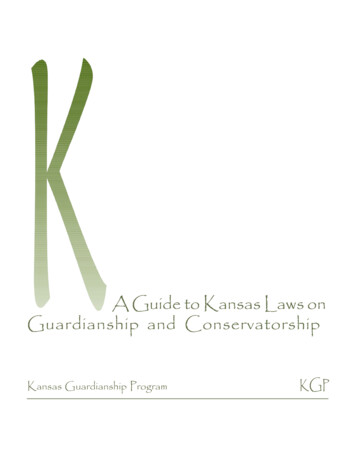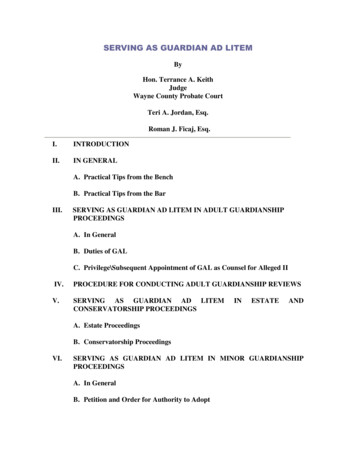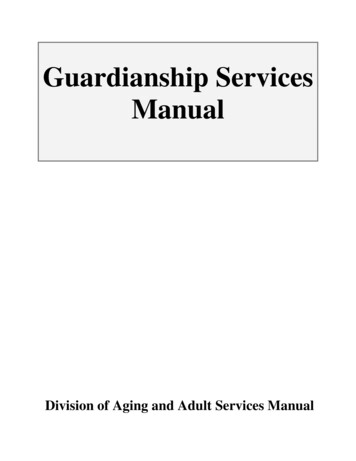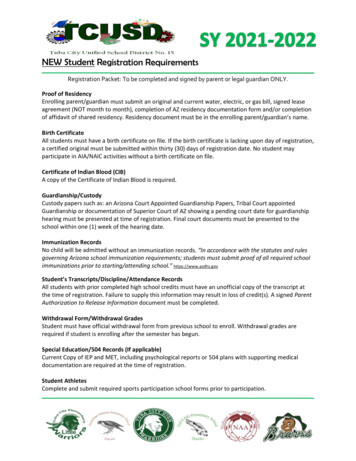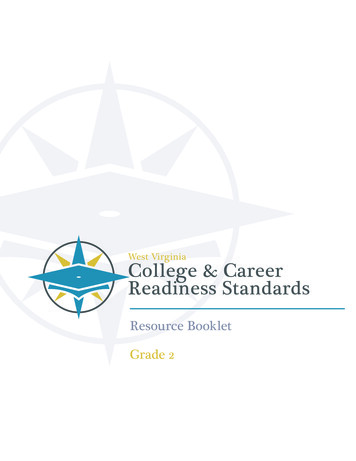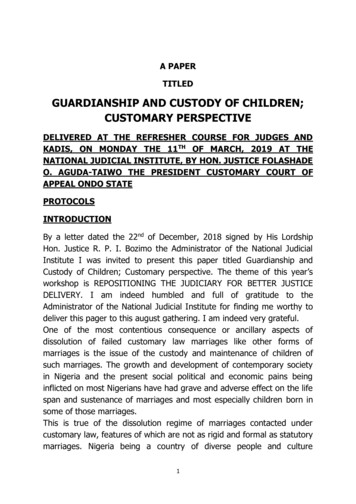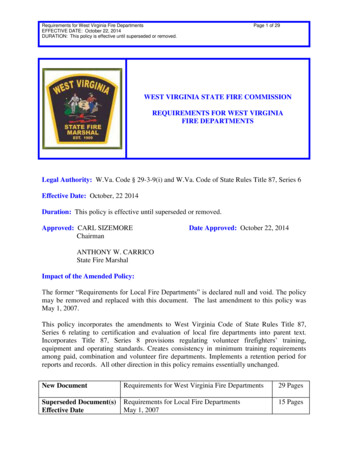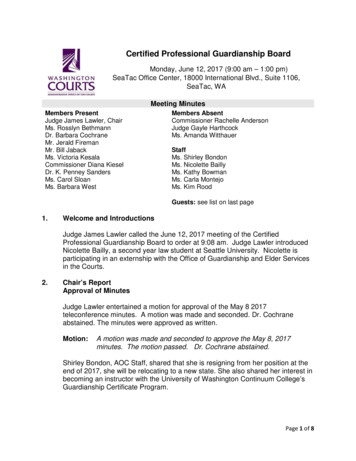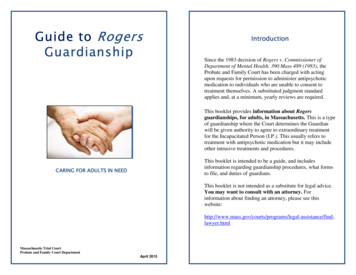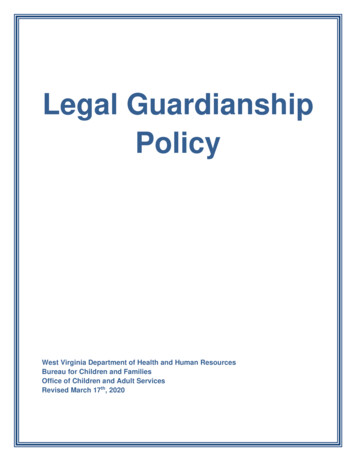
Transcription
Legal GuardianshipPolicyWest Virginia Department of Health and Human ResourcesBureau for Children and FamiliesOffice of Children and Adult ServicesRevised March 17th, 2020
ContentsIntroduction . 41.01.1Introduction and Overview . 41.2Philosophical Principles . 51.3Mission and Vision . 61.4Legal Basis for Legal Guardianship . 61.5Definitions . 61.6Nondiscrimination, Grievance Procedure & Due Process Standards, ReasonableModification Policies . 112.0 Intake . 152.12.2Eligibility for Legal Guardianship . 16IV-E Eligibility in Legal Guardianship . 173.0 Assessments . 173.1Introduction . 173.2Health Care . 183.3Comprehensive Assessment Planning System (CAPS) . 183.4Regional Clinical Reviews . 193.4Educational Stability . 193.5 Life Skills Assessment and Transitioning Services for Youth 14 Years and Older . 19Case Plan . 204.05.0 Case Management . 215.1 Placement . 21Subsidy . 215.2.1 Financial Subsidy . 215.2.2 Conditional/Deferred Subsidy. 235.2.3 Medical Subsidy. 235.2.4. Non-recurring Expenses . 235.2.5 Worker Actions to set up Subsidy . 245.3 Child Financial Account. 245.4 Educational Assistance . 246.0 Case Review . 256.16.26.36.4Court Review . 25Court Action to Finalize Legal Guardianship . 26Yearly Subsidy Review . 27Disruption of Legal Guardianship . 286.4.1 Disruption - child placed in DHHR custody . 286.4.2 Disruption – with a Successor Guardian . 297.0 Case Closure . 302
7.1Records Management . 308.0 Other. 308.1 Going from Legal Guardianship to Adoption . 308.2 Youth in Legal Guardianship with Child of their own . 313
Legal Guardianship1.0Introduction1.1Introduction and OverviewPermanency improves the outcome in virtually every area of a child’s life. Childrenwho achieve permanency have a better chance to form strong emotional bondsand to live happy lives. They are more likely to have access to health care, live insafe communities, finish school and go on to succeed on their own as adults. Theyare less likely to have behavioral or mental health problems, abuse alcohol ordrugs, get into trouble with the law or face poverty or homelessness.The federal government acknowledges only 4 primary permanency options for children in foster care: ReunificationAdoptionLegal GuardianshipPlacement with a fit and willing relative (kinship care)A fifth option is APPLA - Another Planned Permanent Living Arrangement – theCourt may sanction this permanency option to meet the individual child’s needs.After considering and ruling out reunification, adoption, legal guardianship andplacement with a fit and willing relative, and ensuring the child is aged 16 or older,the MDT may conclude that APPLA is the most appropriate permanency plan forthe child.A legal guardianship is a judicially created and legally binding relationship betweena child and caretaker which is intended to be permanent and self-sustaining asevidenced by the transfer to the caretaker of the following parental rights with respect to the child: Protection, education, care and control of the child, custody ofthe child and decision making. Parental rights are not required to be terminated inorder to sanction a legal guardianship under WV Code §49-4-112 The FosteringConnection to Success and Increasing Adoptions Act 2008 (Fostering Connections) allows for the State to enter into Guardianship agreements to provide assistance payments to grandparents and other kin/relatives who have assumed theLegal Guardianship of children for whom they have cared for as a certified foster/adoptive parent and for whom they have committed to care for on a permanentbasis. The Fostering Connections Act allows for Title IV-E reimbursement for these4
payments to kinship/relative Legal Guardians. In WV, the Department has defined kinship/relatives for the purposes of the placement of children as “any personrelated to the child by blood or marriage including cousins and in-laws. This includes persons who the child considers a relative, such as a godparent or significant others whom the child claims as kin may also be considered as a placementresource”. Legal Guardianship is still permitted with non-kinship/relative but will notbe IV-E reimbursable.WV state code provides for the Department to utilize Legal Guardianship as a viable permanency option once reunification and adoption have been ruled out. LegalGuardianship was added to the WV State Code in 1998 as a result of the 1997Adoption and Safe Families Act (ASFA; PL 105-89).(For a more thorough discussion on permanency options, refer to FosterCare Policy Section 4.4 Permanency Planning)1.2Philosophical PrinciplesSafety is the paramount concern that must guide all child welfare services. Whenmaking decisions about a child, including those decisions regarding services provided, placement and permanency planning, the safety of the child must be theforemost issue in determining what is in the best interest of the child.Permanency planning efforts should begin as soon as a child enters the custodyof the Department or when it appears it may happen. This is done through concurrent planning. Concurrent planning should be utilized to allow staff to work to reunify the family while simultaneously planning for the possibility that reunificationwill not succeed. All possible resources should be considered in order to arrive atthe least restrictive, appropriate environment for the child. Priority considerationmust be given to the child’s relatives for the most suitable placement provided thebest interest of the child is the primary consideration. Throughout the life of thechild’s case, appropriate family members should be sought out and considered forplacement of the child or for family connections with the child.The creation of a permanent family for children in custody is the main objective forchildren that are unable to be reunified with their family of origin. Adoption must bethe primary choice for permanency planning, with other alternatives being considered only after adoption has been ruled out. Once reunification and Adoption havebeen ruled out, Legal Guardianship may be considered provided it would be in thechild’s best interest.5
1.3Mission and VisionOur Mission: “The Bureau for Children and Families provides an accessible, integrated, comprehensive quality service system for West Virginia’s children, familiesand adults to help them achieve maximum potential and improve their quality oflife.”Our vision: “West Virginia’s children, families, and adults have achieved well-being, safety, and independence.”West Virginia’s Department of Health and Human Resources (DHHR or the Department), Bureau for Children and Families (BCF) is dedicated to providing andassuring accessible quality services for individuals and families to achieve theirmaximum potential and improve their quality of life. The Office of Children andAdult Services (CAS) is committed to providing a collaborative service deliverysystem that assures safety and promotes the health, stability and well-being ofvulnerable adults, children and families.1.4Legal Basis for Legal GuardianshipThe WVDHHR is given the responsibility to provide child welfare services to thechildren of WV through Chapters 48 and 49 of the Code of West Virginia. TheRules of Procedure for Child Abuse and Neglect Proceedings issued by the Supreme Court of West Virginia and opinions entered by the Court in various casesalso provide further interpretation and clarification of the statutes. The statutes maybe found within FACTS (go to FACTS, Help, Court/Legal, WV Code) or on theinternet at www.legis.state.wv.us. The Rules of Procedure for Child Abuse andNeglect Proceedings and Court Opinions may be found on the internet atwww.state.wv.us/wvsca.(For additional Legal/Regulatory guidance impacting permanency, seeAdoption Policy Section 1.1)1.5DefinitionsAbandonment - Any conduct by the birth mother, unknown mother, legal father,determined father, birth father, unknown father or putative father that demonstratesa purpose to forego all duties and relinquish all parental claims to the child.6
Adoption - The judicial act of creating the relationship of parent and child where itdid not previously exist. Adoption is a family-building permanency option that provides a permanent, forever home for a child. A voluntary surrender or terminationof parental rights from the birth parents must occur before the adoption can befinalized in a court of law. The adoptive parent then becomes the child’s legal parent and as such has the formal and legal responsibility for the childAdult - A person who is eighteen years of age or older.Agency - A public or private entity, including the Department of Health and HumanResources, that is authorized by law to place children for adoption or legal guardianship.AAPLA - Another Planned Permanent Living Arrangement. APPLA is a case plandesignation for children in out-of-home care for whom there is no goal for placement with a legal, permanent family. APPLA is an acceptable designation only afterreunification, adoption, permanent guardianship, or placement with a fit and willingrelative are found not to be in the best interests of the child. However, APPLAdesignations must include plans for permanent placements of children and youththat meet their developmental, educational, and other needs.Birth Father - The biological father of the child.Birth Mother - The biological mother of the child.CASA – A Court Appointed Special Advocate (CASA) representative is appointedprimarily in civil protection proceedings involving child abuse and/or neglect. Duties of a CASA representative include an independent gathering of informationthrough interviews and review of records; facilitating prompt and thorough reviewof the case; protecting and promoting the best interests of the child; follow-up andmonitoring of court orders and case plans; making a written report to the Court withrecommendations concerning the child’s welfare; and negotiating and advocatingon behalf of the child. CASA remain involved until permanency is achieved.Child’s Case Plan - The plan prepared by the Department pursuant to the federalrequirements for a comprehensive plan for every child in foster care developedwithin 60 days of the date the child entered foster care and the requirements ofWV State Code 49-6-5 following the adjudication by the Court that the child is anabused and/or neglected child. For youth entering foster care through juvenile proceedings, the same requirements for all foster children including the Child’s CasePlan must be followed. The Child’s Case Plan is a comprehensive document whichdirects the provision of all casework services including the services provided to the7
child. All casework services provided to the child while the child is in placementmust be delivered in accordance with the Child’s Case Plan.Concurrent Planning - A Permanency planning strategy for assuring an expedient permanent placement for a child by simultaneously planning for reunificationand an alternative permanent placement such as adoption or legal guardianship.Conditional Subsidy – also referred to as Deferred Subsidy. Families with deferred subsidy agreements have the option of negotiating payments in the future,should the child’s needs or family’s circumstances warrant a monetary subsidy.Consent - The voluntary surrender to an individual, not an agency, by a minorchild’s parent or guardian, for purposes of the child’s adoption, of the rights of theparent or guardian with respect to the child, including the legal and physical custody of the child. 48-22-108Criminal Identification Bureau Record – (CIB) - A fingerprinting process thatidentifies those who have been arrested or convicted of a criminal act or behavior.See CIB policy.Determined Father - a person: (1) in whom paternity has been established pursuant to the provisions of article 24-101 and section 16-5-12 of the W. V. Code, byadjudication or acknowledgement; or (2) who has been otherwise judicially determined to be the biological father of the child entitled to parental rights; or (3) whohas asserted his paternity of the child in an action that is pending at the time of thefiling of the adoption petition. See 48-22-109 in WV state code.Disruption - a process that ends after the child is placed in a legal guardianshiphome and before it is legally finalized, resulting in the child’s return to (or entry into)foster care or placement with new legal guardians.Dissolution – a process in which the legal relationship between the legal guardians and the child is severed, either voluntarily or involuntarily, after the legal guardianship is legally finalized. This results in the child’s return to (or entry into) fostercare or placement with new legal guardians.Genetic and Social History - A comprehensive report on the birth parents, siblings, grandparents, etc., which shall contain the following information: Medicalhistory, health status, cause of and age at death, height, weight, eye and hair color,ethnic origins, levels of educational and professional achievement, and religion.Guardian Ad Litem (GAL) - The court appointed attorney assigned to the childduring the abuse and neglect proceedings. This person’s responsibility to the childcontinues until permanency is achieved.8
Health History – is a comprehensive report of the child’s health status at the timeof placement for adoption including medical history, including neonatal, psychological, physiological and medical care history.Homestudy - A homestudy or family assessment is the process by which information is gathered and evaluated to assess a family’s ability to provide care forchildren who may be placed in the home through foster care. This assessmentincludes evaluating the physical environment of the home for safety and to determine adequate space, the family’s capacity for parenting, as well as, the family’smotivation and commitment to providing a safe, caring environment for children.Legal Father - Before adoption, the male person having the legal relationship ofparent to a child: (1) who is married to its mother at the time of conception; or (2)who is married to its mother at the time of birth of the child; or (3) who is the biological father of the child and who marries the mother before an adoption of thechild.Legal Guardianship - A legally binding relationship between a child and a caretaker, other than the child’s biological parent, that may be considered as a permanent placement option for the child. This arrangement transfers all the rights andresponsibilities for a child from the Department to the caretaker through a courtsanctioned process. Parental rights are not required to be terminated for a child tobe in a Legal Guardianship. A monthly maintenance subsidy, medical card, andnon-recurring subsidy may be provided to eligible children placed in an approvedhome to ease the financial burden of caring for the child.Non-recurring Expenses - Non-recurring expenses are one-time expenses directly related to the finalization of a child with special needs. Typical expenses thatare paid or reimbursed to the family include the home study fees, attorney fees,replacement of the birth certificate, and travel to and from the child, including mileage, lodging and meals.Outsider Father - The biological father of a child born to or conceived by themother while she is married to another man who is not the biological father of thechild.Permanency Plan - A formal written part of the Child’s Case Plan that determinesthe permanent placement for a child in the state’s custody. Permanent placementsinclude reunification, adoption, legal guardianship or placement with a fit and willing relative. If those options have been exhausted, the Court may consider an APPLA plan such as emancipation or continued foster care.9
Placement with a fit and willing relative - If reunification or adoption is not in thechild’s best interest, the Court may place the child with a suitable adult relative whohas made a commitment to provide a suitable and permanent home for the childuntil the child reaches the age of majority and to prepare the child for adulthoodand independence. Permanent placement with a fit and willing relative does notterminate the parent-child relationship, therefore the child may still inherit from thebiological parents and the biological parents may still be ordered by the court toprovide financial and medical support.Relative/Kinship Care – Services provided by any person related to the child byblood or marriage including cousins and in-laws. Persons the child considers arelative, such as a godparent or significant others the child claims as kin may alsobe considered as a placement resource.Relinquishment - The voluntary surrender to an agency by a minor child’s parentor guardian, for purposes of the child’s permanency. This surrenders the rights ofthe parent or guardian with respect to the child, including the legal and physicalcustody of the child.Reunification - When children must be removed from their birth families for theirprotection, the permanency goal is to achieve reunification with the birth as safelyas possible.Sibling – Any individual the child considers a sibling or an individual who is considered by state law to be a sibling or who would be considered a sibling understate law if it were not for a disruption in parental rights, such as a termination ofparental rights, divorce, or death of a parent.Specialized/Therapeutic Foster/Adoptive Care – A service that combines thebenefits of the protection, support and nurturing of a family foster/adoptive caresetting with the benefits of treatment services provided by the agency and foster/adoptive parents. Specialized foster/adoptive care is designed to serve childrenwith a variety of issues such as emotional/behavioral disturbance, psychiatric diagnoses, delinquency, developmental disorders, intellectual functioning deficiencies, and medical disorders.Subsidized Legal Guardianship –Subsidized legal guardianship is the transferof legal responsibility for a minor child from the state to a private certified caregiveror guardian, who is provided with a monthly subsidy and/or medical card for thecare and support of the child. The transfer of legal responsibility removes the childfrom the child welfare system, allows a caregiver to make important decisions onthe child’s behalf, establishes a long-term caregiver for the child, and addressestheir financial needs through ongoing subsidy.10
Transitioning Adult – An individual with a transfer plan to move to an adult settingwho meets one of the following conditions:(1) Is eighteen years of age but under twenty-one years of age, was in departmental custody upon reaching eighteen years of age and committed anact of delinquency before reaching eighteen years of age, remains underthe jurisdiction of the Juvenile Court, and requires supervision and care tocomplete an education and or treatment program which was initiated priorto the eighteenth birthday.(2) Is eighteen years of age but under twenty-one years of age, was adjudicated abused, neglected, or in departmental custody upon reaching eighteen years of age and enters into a contract with the Department to continuein an educational, training, or treatment program which was initiated prior tothe child’s eighteenth birthday.Unknown Father - A biological father whose identity the biological mother swearsis unknown to her.1.6Nondiscrimination, Grievance Procedure & Due Process Standards, ReasonableModification PoliciesNondiscriminationAs a recipient of Federal financial assistance, the Bureau for Children and Families (BCF)does not exclude, deny benefits to, or otherwise discriminate against any person on theground of race, color, national origin, disability, age, sex, sexual orientation, religion orcreed in admission to, participation in, or receipt of the services and benefits under anyof its programs and activities, whether carried out by BCF directly or through a contractoror any other entity with which BCF arranges to carry out its programs and activities.This statement is in accordance with the provisions of Title VI of the Civil Rights Act of1964 (nondiscrimination on the basis of race, color, national origin) (“Title VI”), Section504 of the Rehabilitation Act of 1973 (nondiscrimination on the basis of disability)(“Section 504”), the Age Discrimination Act of 1975 (nondiscrimination on the basis ofage) (“Age Act”), regulations of the U.S. Department of Health and Human Servicesissued pursuant to these three statutes at Title 45 Code of Federal Regulations Parts 80,84, and 91.The Bureau for Children and Families shall not retaliate against, intimidate, threaten,coerce, or discriminate against any individual for the purpose of interfering with any rightor privilege secured by Title VI, Section 504 or the Age Act, or because she or he hasmade a complaint, testified, assisted, or participated in any manner in an investigation,proceeding, or hearing.In addition, BCF will make all reasonable modifications to policies and programs to ensurethat people with disabilities have an equal opportunity to enjoy all BCF programs,services, and activities. For example, individuals with service animals are welcomed in11
Department of Health and Human Resources, Bureau for Children and Families, officeseven where pets are generally prohibited.In case of questions, or to request an auxiliary aid or service for effective communication,or a modification of policies or procedures to participate in a BCF program, service, oractivity, please contact:WV DHHR: Children and Adult ServicesContact Person: Health and Human Resources SpecialistTelephone number: (304) 558-7980Grievance Procedure and Due Process StandardsIt is the policy of the Bureau for Children and Families (BCF) not to discriminate on thebasis of disability. BCF has adopted an internal grievance procedure providing for promptand equitable resolution of complaints alleging any action prohibited by Title II of theAmericans with Disabilities Act of 1990, 42 U.S.C. § 12131 et seq., and/or Section 504 ofthe Rehabilitation Act of 1973, 29 U.S.C. § 794. These statutes prohibit discrimination onthe basis of disability. In addition, the Bureau for Children and Families does notdiscriminate against individuals due to race, color, national origin, disability, age, sex,sexual orientation, gender identity or religion. Laws and Regulations, 28 C.F.R. Part 35and 45 C.F.R. Part 84, may be examined by clicking here or visitinghttps://www.ada.gov/reg3a.html.Any person who believes he or she has been subjected to discrimination on the basis ofdisability may file a grievance under this procedure. It is against the law for any Bureaufor Children and Families official to retaliate in any way against anyone who files agrievance or cooperates in the investigation of a grievance.Procedure:Grievance requests due to alleged discriminatory actions must be submitted to the Department of Health and Human Resources, Equal Employment Opportunity (EEO)/CivilRights Officer, within 180 business days of the date the person filing the grievance becomes aware of the alleged discriminatory action. To file the grievance, the grievant mustcomplete form IG-CR-3 and mail to West Virginia Department of Health and Human Resources, Office ofHuman Resources Management, EEO/Civil Rights Officer, One Davis Square, Suite 400,Charleston, WV 25301. The grievant may also contact the WV DHHR, EEO/Civil RightsOfficer, for more information.WVDHHR: Office of Human Resource ManagementContact Person: EEO/Civil Rights OfficerTelephone number: (304) 356-4566A grievance must be in writing, containing the name and address of the person filing it.The grievance must state the problem or action alleged to be discriminatory and theremedy or relief sought.12
EEO/Civil Rights Officer shall conduct an investigation of the grievance. This investigationmay be informal, but it must be thorough, affording all interested persons an opportunityto submit evidence relevant to the grievance. EEO/Civil Rights Officer shall maintain thefiles and records of Bureau for Children and Families relating to such grievances.The EEO/Civil Rights Officer shall issue a written decision on the grievance no later thanthirty (30) calendar days after its filing, unless the Coordinator documents exigentcircumstances requiring additional time to issue a decision.The person filing the grievance may appeal the decision by contacting the U.S.Department of Health and Human Service, Office for Civil Rights.The availability and use of this grievance procedure doesn’t prevent a person from filinga private lawsuit in Federal court or a complaint of discrimination on the basis of disabilitywith the:Office for Civil RightsU.S. Department of Health & Human Services200 Independence Ave., S.W.Room 509F HHS Bldg.Washington, D.C. 20201800-368-1019 (voice)202-619-3818 (fax)800-537-7697 (TDD)OCRComplaint@hhs.gov (email)The Bureau for Children and Families will make appropriate arrangements to ensure thatindividuals with disabilities are provided reasonable modifications, if needed, toparticipate in this grievance process. Such arrangements may include, but are not limitedto, providing interpreters for the deaf, providing taped cassettes of material for the blind,or assuring a barrier-free location for the proceedings. The EEO/Civil Rights Officer willbe responsible for such arrangements.A: Grievances Regarding the Child Protective Services Worker or Casework ProcessAt any time that the Bureau for Children and Families (BCF) is involved with a client, theclient (adult or child), or the counsel for the child has a right to express a concern aboutthe manner in which they are treated, including the services they are or are not permittedto receive.Whenever a parent, child or counsel for the parent or child has a complaint about ChildProtective Ser
the MDT may conclude that APPLA is the most appropriate permanency plan for the child. A legal guardianship is a judicially created and legally binding relationship between a child and caretaker which is intended to be permanent and self-sustaining as evidenced by the transfer to the caretaker of the following parental rights with re-
